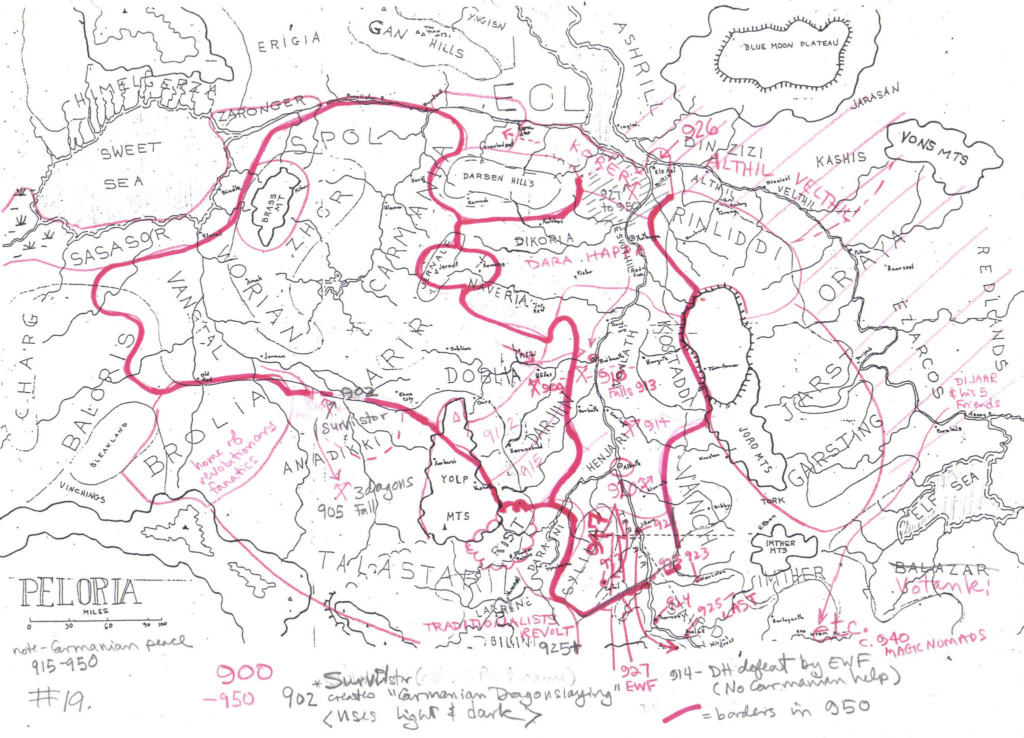899 to 910 were the height of the Empire of the Wyrms Friends‘ magical power and wealth. The Third Council were worshiped as gods, arguably they were gods in the mundane world. They possessed vast magical power at their disposal, and had armies of wyrms, dragonewts, dream dragons, trolls, etc.
But the cracks in the edifice had already formed. In 890 the Elder Wilds broke away from the EWF, and soon after Ralios and Brolia rebelled. The Jrusteli were a constant threat, and the Machine City siege was unexpected costly. But despite all this, the Grand Ritual was near its culmination and the EWF maintained the Proximate Holy Realm that united the mundane and divine realms. This was a time of great extravagant experiments such as those we can see in the ruins of Pavis, but also no doubt throughout Dragon Pass.
The cracks widened, and in 910 Dara Happa and Talastar rebelled. The resources of the empire contracted just as the demands greatly increased. Resources needed for the Grand Ritual were diverted to deal with these crises. When the Machine City finally fell, the EWF threw everything it could at the rebels, with an army led by one of the gods of the Third Council, Drang the Diamond Storm Dragon. This was a huge allocation of resources and entangled the Third Council in the mundane – and a huge setback in the Grand Ritual. Nonetheless, the Third Council figured that reconquering the lost subjects would increase the magical resources enough to quickly get things back on course.
To everyone’s shock, Drang was defeated by the Orlanthi hero Alakoring and his Orlanth Rex magic. South Peloria was quickly lost to an alliance that included Dara Happa, Carmania, and Alakoring. The animal nomads returned to Prax under the leadership of Jaldon Goldentooth.
Again, the Grand Ritual was delayed and in 947 the EWF committed everything it could in a major counter-attack that reached Alkoth before it was ended. The EWF still had a formidable military with its dragonewt and wyrmish allies, but in 956 a Pelorian offensive conquered Saird, which became the anti-EWF center led by a savage but heroic king. Although there were two or three sieges in Saird afterwards, the EWF never recovered.
By 960, the EWF was in a late decadence. Dragon Pass was too powerful for foreigners to conquer, but completion of the Grand Ritual was ever further away and resources needed to complete it were always diverted away. From 900-960 this was usually because of a military crisis, but after 960 it was more often for the self-indulgent demands of the remaining members of the Third Council. The Third Council were still magically and technically sophisticated, more so than their neighbors, but they are self-indulgent and spiritually exhausted. In 1042, the Inhuman King decided that the secrets he had shared were not being used appropriately. Dragonewt forces, assisted by a small band of trolls of the Blue Moon cult, killed all key personnel of the EWF and stole or destroyed all important artifacts. The EWF ceased to exist.
![]()
![]()
That last century of the EWF is often glossed over, but it was likely pretty wild. God Learner exiles, strange and terrible cults apathetically ignored by the Third Council, Old Way Traditionalists openly defying the Third Council, arrogant mystics, the Stitched Zoo and worse, you name it. The individual Third Council members believed themselves to be gods, and honestly their power was pretty persuasive. But that late stage decadence was something out of a Michael Moorcock story.
The Kingdom of Saird must have been a strange thing, won by anti-EWF ghazis from Talastar, Carmania, and Dara Happa, and ruled by Verenmars and his dynasty. For generations, warriors and adventurers in Peloria would go to Saird to fight against the EWF, and at least one Carmanian shah fell in battle fighting the EWF.
Given that the source of the EWF’s power was its draconic associations, having the dragons turn on them was uniquely devastating. Everyone who could speak with the dragons was identified and killed by assassins. It was a terrible purge, only possible because the Third Council had somehow alienated the source of their power.

